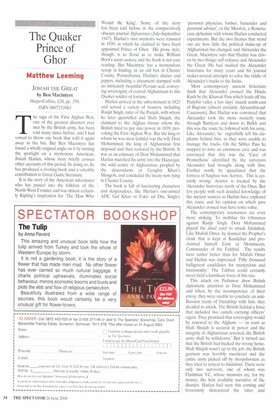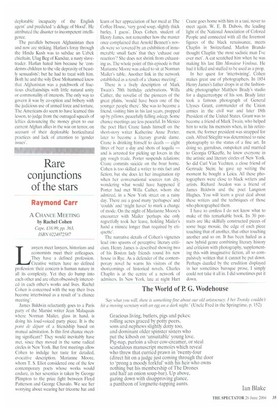The Quaker Prince of Ghor
Matthew Leeming
JOSIAH THE GREAT by Ben Macintyre HarperCollins, £20, pp, 350, ISBN 0007151063 The saga of the First Afghan War, one of the greatest disasters ever met by the British army, has been told many times before, and I had vowed to throw any book that told it again away in the bin. But Ben Macintyre has found a wholly original angle on it by turning the spotlight on a mysterious American, Josiah Harlan, whose story briefly crosses other accounts of this period. In doing so, he has produced a riveting book and a valuable contribution to Great Game literature.
It is the story of the American adventurer who has passed into the folklore of the North-West Frontier and was almost certainly Kipling's inspiration for 'The Man Who Would Be King'. Some of the story has been told before in the comparatively obscure journal Afghanistan (July-September 1947). Harlan's own memoirs were reissued in 1939, in which he claimed to have been appointed Prince of Ghor. His prose style, though, is so florid as to make William Boot's seem austere and the book is not easy reading. But Macintyre has a tremendous scoop in finding, in an old box in Chester County, Pennsylvania, Harlan's diaries and papers, including a document stamped with an intricately beautiful Persian seal, conveying sovereignty of central Afghanistan to this Quaker soldier of fortune.
Harlan arrived in the subcontinent in 1823 and served a variety of masters, including Ranjit Singh, ruler of the Punjab, with whom he later quarrelled and Shah Shujah. the claimant to the Afghan throne whom the British tried to put into power in 1839, provoking the First Afghan War. But the king to whom he was most faithful was the wily Dost Mohammed, the king of Afghanistan first deposed and then restored by the British. It was as an emissary of Dost Mohammed that Harlan marched his army into the Hazarajat, the wild centre of Afghanistan. peopled by the descendants of Genghiz Khan's Mongols, and concluded the treaty now lying in Chester County.
The book is full of fascinating characters and desperadoes, like Harlan's one-armed ADC Gul Khan or Fakir ud Din, Singh's 'personal physician, barber, bartender and personal adviser', or the Moolvie, a Rosicrucian alchemist with whom Harlan conducted experiments. But the two themes that stand out are how little the political make-up of Afghanistan has changed, and Alexander the Great. Macintyre says that Harlan was driven by two things: self-reliance and Alexander the Great. He had studied the Alexander historians for many years and his journal makes several attempts to solve the riddle of Alexander's tracks to the Indus.
Most contemporary ancient historians think that Alexander crossed the Hindu Kush by the Ithawak Pass which leads off the Panjshir valley a few days' march north-east of Bagram (almost certainly Alexandria-adCaucasum). But Harlan was convinced that Alexander took the more westerly route through Bamiyan and down to Balkh and this was the route he followed with his army. Like Alexander, he regretfully left his elephants behind him, as they were unable to manage the tracks. On the Sibber Pass he stopped to note an enormous cave and was convinced that this was the 'Cave of Prometheus' identified by the surveyors Alexander had brought along with him. Further north, he speculated that the fortress of Saighan was Aornos. This is certainly wrong: Aornos is located by the Alexander historians north of the Oxus. But few people with such detailed knowledge of the ancient sources as Harlan have explored this route and his opinion on which pass Alexander crossed may have some value.
The contemporary resonances are even more striking. To mobilise his tribesmen against Ranjit Singh, Dost Mohammed played the jihad card to attack Jalalabad. Like Mullah Omar, he donned the Prophet's cloak that is kept at Kandahar and proclaimed himself Emir ul Momineem, Commander of the Faithful. The results were rather better than for Mullah Omar and Harlan was impressed: 'Fifty thousand belligerent candidates for martyrdom and immortality.' The Taliban could certainly never field a kamikaze force of this size.
This attack on Peshawar drew British diplomatic attention to Dost Mohammed and when, by the incompetence of their envoy, they were unable to conclude an antiRussian treaty of friendship with him, they decided to attack. The British fielded a force that included two camels carrying officers' cigars. They promised that sovereignty would be restored to the Afghans — *as soon as Shah Shujah is secured in power and the integrity of Afghanistan restored, the British army shall be withdrawn.' But it turned out that the British had backed the wrong horse. Shah Shujah w-asn't up to the job, the British garrison was horribly murdered and the entire army picked off by sharpshooters as they tried to retreat to Jalalabad. There were only two survivors, one of whom was Flashman VC, whose memoirs are, for my money, the best available narrative of the disaster. Harlan had seen this coming and ferociously denounced the 'utter and
deplorable incapacity of the English agent' and predicted 'a deluge of blood'. He attributed the disaster to incompetent intelligence.
The parallels between Afghanistan then and now are striking. Harlan's foray through the Hindu Kush was to subdue an Uzbek chieftain, Ulug Beg of Kunduz, a nasty slavetrader. Harlan hated him because he 'condemns children to the vile depravity of beastly sensualists' but he had to treat with him. Both he and the wily Dost Mohammed knew that Afghanistan was a patchwork of fractious chieftainships with little natural unity or commonality of interests, The only way to govern it was by co-option and bribery with the judicious use of armed force and torture. The Americans do seem to have learned this lesson, to judge from the outraged squeals of lefties denouncing themoney given to our current Afghan allies in the war on terror, on account of their deplorable horticultural practices and lack of attention to 'gender issues'.



































































 Previous page
Previous page